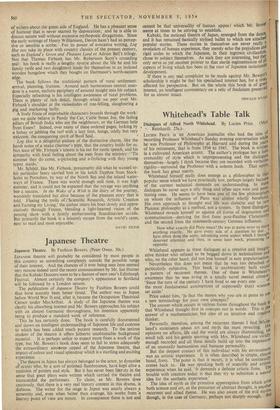Japanese Theatre
Japanese Theatre. By Faubion Bowers. (Peter Owen. 30s.)
JAPANESE theatre will probably be considered by most people in this country as something completely outside the possible range of their interest. And the chances of it ever being seen here seemed very remote indeed until the recent announcement by Mr. Ian Hunter that the Kabuki Dancers were to be a feature of next year's Edinburgh Festival. Almost certainly the company's appearance in Scotland will be followed by a London season.
The publication of Japanese Theatre by Faubion Bowers could thus have scarcely been better timed. The author was in Japan before World War II and, after it, became the Occupation Theatrical Censor under MacArthur. A study of the Japanese theatre was clearly his absorbing interest and Mr. Bowers approaches his subject with an almost Germanic thoroughness, his intention apparently being to produce a standard work of reference.
This he has certainly done. The book is carefully documented and shows an intelligent understanding of Japanese life and customs to which has been added much patient research. To the serious student of the theatre it offers hitherto unobtainable background material. It is perhaps unfair to expect more from a work of this type, but Mr. Bowers's book does seem to fail to stress adequately the extraordinary sensaous appeal of the Japanese theatre, that impact of colour and visual splendour which is a startling and exciting experience.
The theatre in Japan has always belonged to the actor, to dynasties (X actors who, by a sort of polished flamboyance, have kept alive a tradition of pattern and style. But it has never been liter:try in the sense that great plays were written which carried the theatre and transcended the performers. To claim, as Mr. Bowers does cautiously, that there is a very real literary content in this drama, is dubious. The writer for the stage in Japan was nearly always a nonentity and, even when better than average, his works from literary point of view are minor. In consequence there is not and cannot be that universality of human appeal which Mr. Bowel seems at times to be striving to establish.
Kabuki, the national theatre of Japan, emerged from the dance; and it has remained basically stylised ballet to which are attachec popular stories. These stories in themselves are never really a, revelation of human experience, they merely echo the prejudices etc rigid codes to which the Japanese, in their ingrown civilisation chose to subject themselves. As such they are interesting, but the only serve as yet another pointer to that sterile regimentation of" aspects aspects of living which has been at the root of Japanese isolationis' development.
If there is any real complaint to be made against Mr. Bowers's scholarship it might be that his specialised interest has, for a tintn affected his perspective. But on the whole this book is of Brea; interest, an intelligent commentary on a relic of feudalism preserve" for us almost intact.
OSWALD WYND


































































 Previous page
Previous page